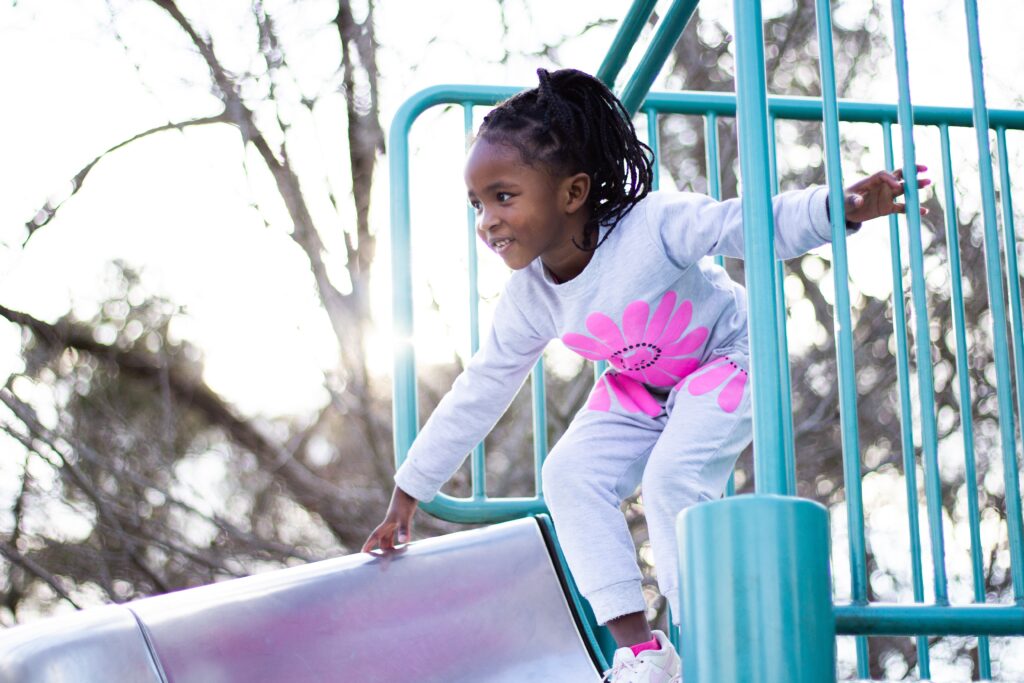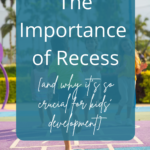The Importance of Recess [and why it’s so crucial for kids’ development]
As parents, we often overlook the importance of recess in our children's lives. Recess is an essential part of a child's development and can have long-lasting effects on their social, physical, and cognitive abilities.

The Benefits of Recess
Play. Learn. Thrive.™ only endorses products we authentically love and use. Some of the product links in this post may be affiliate links. That means that if you click them and make a purchase, this site makes a commission. Play. Learn. Thrive.™ is also an Amazon Associate. As an Amazon Associate, we earn from qualifying purchases. It will have no impact on the price you pay or the experience of your purchase.
Recess is a critical part of a child's day, furnishing them with the chance to cultivate social abilities, concentrate, gain knowledge, and participate in physical exercise. Recess can be beneficial for a child's mental health, providing an opportunity to reduce tension and anxiety.

Here are 7 benefits of recess:
- Recess offers children the chance to hone their social skills, enabling them to cooperate with others and develop problem-solving strategies while building relationships and gaining self-confidence.
- Recess also gives kids a chance to connect with their classmates in an easygoing atmosphere, which can help them develop cooperative skills and devise solutions while also improving their interpersonal relationships and self-assurance.
- Recess gives children a chance to hone their social skills by forming relationships and bolstering self-assurance.
- Recess also gives kids a chance to practice focusing on tasks for extended periods of time without getting distracted or bored. This type of concentration helps improve cognitive function, which is essential for learning new things both inside and outside the classroom.
- Research shows that regular breaks during school days benefit students’ academic performance since they allow them to recharge their minds after long periods of study or work.
- Physical activity during recess improves fitness levels and increases energy levels throughout the day so kids have enough energy to get through their day. Exercise releases endorphins which help reduce stress levels, too; so when kids come back from recess, they’re more relaxed and better able to concentrate on their studies than before they went out into the playground.
- Finally, mental health benefits are another key reason why recess should be encouraged in schools: children can boost their self-esteem and emotional regulation by participating in activities such as sports or games. And even just being outdoors surrounded by nature has been proven to have calming effects that promote emotional wellbeing too – something we could all benefit from now more than ever.
Types of Recess Activities
Recess is a vital portion of any kid's day and should be given priority. Many teachers struggle to provide children with time in the day to break for play (for various reasons). So here are a few recess activities that are great for the school day and any after-school play.

- Outdoor games are a great way to get kids active during recess. Tag is a classic game that encourages running around outside while trying not to get caught by other players – it’s sure to bring out the competitive spirit in even the shyest of kids. It's a classic for a reason!
- Hopscotch is another popular outdoor game where players must jump from one numbered square to another in order without stepping on any lines or touching any squares they have already jumped over; it’s perfect for developing balance and coordination skills.
- Hide-and-seek requires players to find each other by hiding throughout the playground; it’s also great for teaching problem-solving skills and encouraging creativity when finding hiding places. My kids once played hide-and-seek in a 1-bedroom hotel room for almost an hour 😂
- Group games like four square or dodgeball promote social interaction among students by allowing them work together towards common goals.
- Structured activities offer a chance for more organized playtime with particular objectives–these are usually adult-led so not ideal for recess but they can be a fun way to spend time if outdoor recess is limited for some reason. These exercises often require students to listen to certain instructions, which can help develop their listening skills.
- Arts and crafts allow children to express themselves creatively without any expectations. Focus on the process, not the product!
- Free play gives kids the autonomy to use their imagination however they wish – from constructing castles out of boxes to concocting stories using action figures.
No matter what type of activity is chosen during recess time (or after school play time!), all these different types have something unique to offer that can benefit oung minds growing up.
Ultimately, providing various options will ensure everyone has something to enjoy.
FAQs about The Importance of Recess
Why is school recess important?
School break-time is a significant part of the day for young ones. Taking a break from their academic studies, children are given the chance to engage in physical activity, social interaction, and creative play – all of which help them build gross motor skills, improve coordination, increase energy levels, and foster self-confidence and positive relationships with peers.
Recess also offers children the chance to practice decision-making skills as they navigate different activities and problem-solve during unstructured playtime.
Recess can also be a great way to ease tension and provide kids with an opportunity to engage in activities that are both enjoyable and advantageous for their growth, taking them away from desks or screens.
What does the research say about recess?
Recess is essential for a child's development and education, as it enables them to socialize, exercise, and have a break from formal learning.
Recess allows kids to interact with others, get active and take pauses from school-related tasks.
Research has found that recess helps improve cognitive functioning, emotional regulation, physical health, academic performance, and overall well-being.
Recess also gives students the chance to practice decision-making skills while playing games or engaging in other activities. In addition to these benefits for individual students, recess can promote collaboration among peers which can lead to improved communication skills as well as better classroom behavior.
Do kids need recess?
Yes, kids need recess. Recess provides children with an opportunity to practice important social and physical skills while developing their creativity and imagination. Recess serves as a time for children to take a break, expel energy, and discover how to cooperate with one another in an affable manner.
Research has shown that regular recess can improve academic performance by increasing concentration levels and helping students stay focused on tasks longer than those who do not have recess breaks throughout the day.
Recess also provides an important break from the structured environment of the classroom, which can help reduce stress and anxiety.
Does recess improve grades?
The research is mixed on the direct correlation between recess and grades. Studies have demonstrated that regular breaks for physical activity and outdoor play during school hours can lead to improved concentration, better behavior in class, increased motivation for learning, and greater academic performance.
This suggests that providing regular breaks throughout the day can help improve a child’s ability to focus and learn more effectively. Ultimately, it appears that allowing students time for active play could be beneficial to their overall academic success.
Conclusion
Recess is a vital part of the school day, allowing children to hone their social skills and concentration. Through recess activities such as running around or playing games, children can learn valuable lessons about teamwork and communication.
“Recess is a crucial part of child development, and parents should take the time to learn more about its importance. Play. Learn. Thrive offers simple solutions for busy families looking to foster their children's physical and mental growth.”

